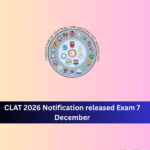CLAT 2025 Registration: To crack CLAT 2025 effectively, a balanced, well-planned strategy combining syllabus mastery, regular practice, and revision is essential. Before you jump to any conclusion, you must check the percentage required in NLU for admission.
Please note that we have given the link at the bottom for Previous papers
- For top NLUs like NLSIU Bangalore, NALSAR Hyderabad, NLU Jodhpur, a good CLAT score (General category) is generally in the range of 95 to 98 marks out of 120. This usually corresponds to a rank within about 140-160 for the top NLU seats.
- For OBC category candidates, the expected good score falls between 83 to 95 marks, depending on the specific NLU and seat availability.
- SC/ST category candidates may need around 70 to 90 marks to secure admission, again varying by NLU tier.
- For other NLUs beyond the top 3-5, the cut-offs tend to be slightly lower, with good scores ranging from 85 to 95 marks for the general category.
Category-wise Good CLAT Score Summary
| Category | Good Score Range (out of 120) | Notes |
| General (UR) | 95–98 | Top 3-5 NLUs |
| OBC | 83–95 | Varies by NLU |
| SC | 74–90 | Depends on NLU |
| ST | 70–86 | Varies with NLU tier |
| EWS | Around 94+ | Close to General category cut-offs |
CLAT 2025 only meant for Admission or it can get good jobs

Exam Pattern
- CLAT UG 2025 is a 2-hour objective test with 120 questions, each carrying 1 mark.
- Negative marking of 0.25 for each wrong answer.
- Sections: English Language, Current Affairs including GK, Legal Reasoning, Logical Reasoning, and Quantitative Techniques.
- Focus more on high-weightage topics like Legal Reasoning, Current Affairs, and English comprehension.
How to Prepare After CLAT 2025 Registration?
1. Create a Realistic & Structured Study Plan
- Allocate time daily to each section according to your strengths and weaknesses.
- Divide preparation into learning, practice, and revision phases.
- Use quality newspapers, monthly current affairs compilations, and standard books for GK and legal awareness.
- Practice 10th standard math textbooks for basics in Quantitative Techniques.
2. Practice Mock Tests & Previous Year Papers
- Regularly attempt full-length mock tests in timed conditions to develop speed and accuracy.
- Analyze your mistakes and focus on weak areas.
- In the last 15 days, focus on solving sectional mock tests and avoid starting new topics.
3. Revise Important Topics and Stay Updated
- Revise major government schemes, important Supreme Court judgments, and recent international and national current affairs.
- Do not overload yourself with new materials close to the exam; focus on revising what you have studied.
4. Improve Reading & Analytical Skills
- Read diverse editorial articles and legal news to build comprehension and analytical skills essential for Legal and Logical Reasoning sections.
- Practice critical reasoning and logical deduction daily.
5. Manage Time Effectively During Exam
- Practice bubble filling (OMR) and question answering without marking on the paper since it’s prohibited.
- Develop a strategy to allocate time per section and question type.
| Study Plan | Daily schedules, allocate time as per strengths/weaknesses |
| Focus on High Weightage | Current Affairs, Legal Reasoning, English comprehension |
| Regular Practice | Timed mocks, previous year papers, sectional tests |
| Revise & Stay Updated | Revise major topics and current affairs; avoid new topics close to the exam |
| Enhance Reading Skills | Improve comprehension & analytical skills through regular reading |
| Exam Strategy | Time management & no marking on the question paper |
| Maintain Health | Mental and physical fitness for exam day |






